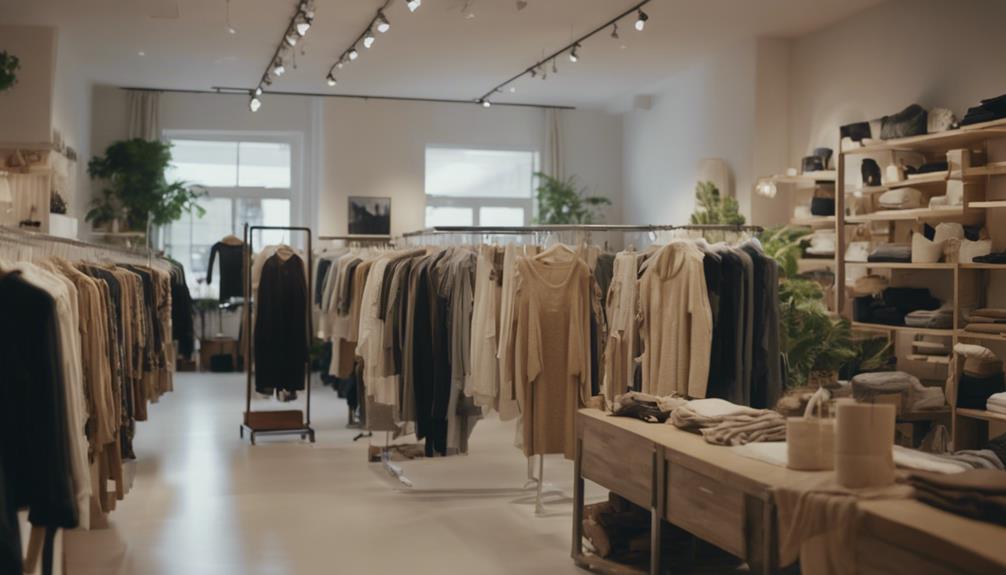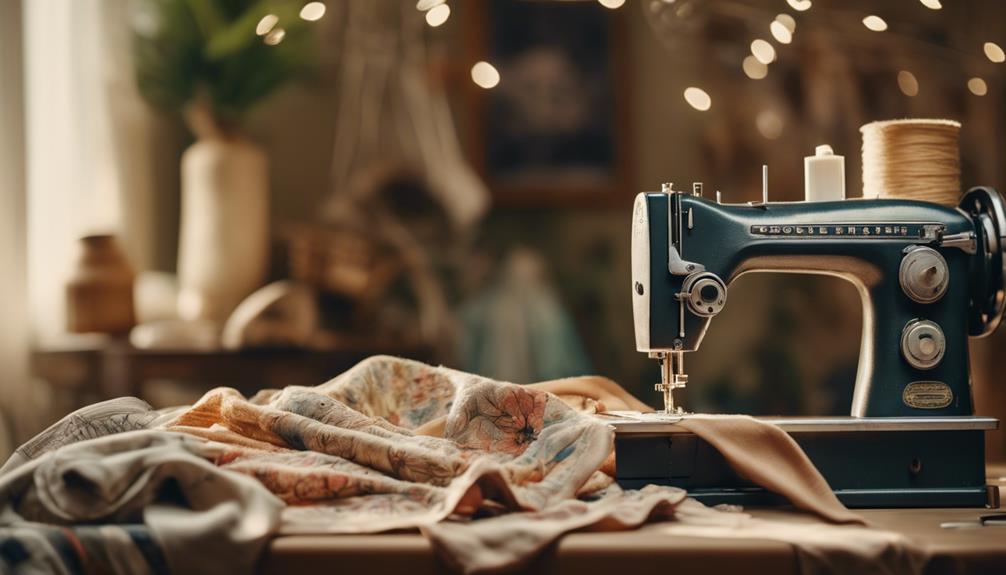Yes, you should definitely care about sustainable fashion! More consumers are prioritizing eco-friendly choices, with 67% factoring sustainability into their purchasing decisions. Brands that embrace sustainable materials gain your trust, making you 72% more likely to buy from them. Plus, 75% of Gen Z shoppers are buying used clothing for environmental reasons. However, many still find sustainability claims confusing, leading to skepticism. While there are challenges in the market, the demand for transparency and responsible practices is growing. If you’re curious about how this trend is shaping the fashion industry, there’s plenty more to explore!
Key Takeaways
- 67% of consumers prioritize sustainable materials in their purchasing decisions, highlighting a significant interest in eco-friendly fashion.
- 75% of Gen Z consumers buy used clothing primarily for environmental reasons, showcasing their commitment to sustainability.
- 60% of consumers are willing to pay more for sustainable packaging, indicating a readiness to support eco-friendly practices.
- 28% of consumers have stopped purchasing from brands with poor sustainability practices, reflecting a growing intolerance for unsustainable options.
Sustainable Fashion Market Overview
The sustainable fashion market, valued at $7,548.2 million in 2022, is expected to grow markedly, reaching $11,122.2 million by 2027, driven by a strong consumer demand for eco-friendly products. This growth reflects a significant shift in purchasing decisions, particularly among younger generations like millennials and Gen Z.
These consumers prioritize sustainable fashion, often opting for brands that use environmentally friendly practices and sustainable materials. Around 67% of consumers now consider sustainability a vital factor when choosing brands, showcasing the increasing importance of environmental impact in their decisions.
This trend is particularly evident among Gen Z, with 75% of them purchasing used clothing specifically for environmental reasons. These choices not only reduce waste but also support the growing market for second-hand and recycled apparel.
Fashion companies are responding by focusing on natural materials, biodegradable clothing, and waste reduction strategies. As the sustainable fashion market expands, it's clear that consumer demand for ethical practices and sustainable products is reshaping the fashion industry, encouraging brands to align with these values to stay relevant and successful.
Consumer Attitudes Towards Sustainability

Consumer attitudes towards sustainability are increasingly shaping brand loyalty and purchasing decisions in the fashion industry. As sustainable fashion rises in popularity, it's clear that consumers value brands that prioritize ethical practices.
Here are three key insights:
- 67% of consumers prioritize sustainable materials when making purchasing decisions.
- 28% of consumers have stopped buying from brands that showcase poor sustainability practices.
- 60% of consumers are willing to pay more for sustainable packaging.
These statistics highlight that consumers express a desire to support eco-friendly brands and sustainable products. A staggering 63% consider a brand's commitment to sustainability essential, reflecting a growing demand for environmental and social responsibility.
However, despite this increased interest, 53% of consumers find sustainability claims confusing, which leads to skepticism about brands' genuine commitments.
Ultimately, if you're in the market for fashion, aligning with brands that adopt sustainable practices can fulfill your desire for eco-friendly options and connect you with a community that values ethical consumption.
As consumer attitudes evolve, brands that embrace sustainability will likely thrive in this competitive landscape.
Challenges in Sustainable Fashion
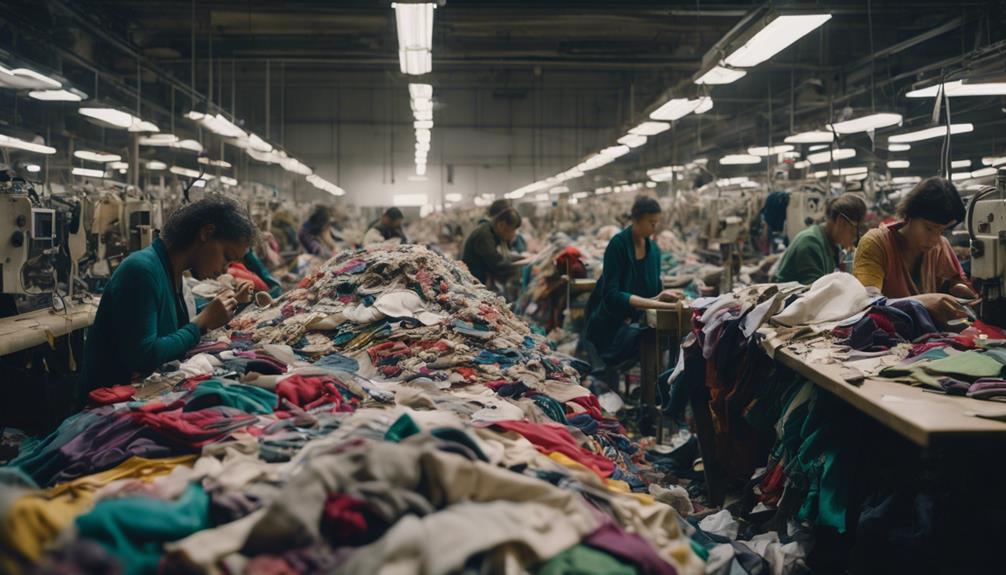
Many brands struggle to navigate the complexities of sourcing truly sustainable materials, which hampers their ability to adopt eco-friendly practices effectively. This challenge leads to consumer skepticism, especially when 53% of shoppers find sustainability claims confusing. For you, sustainable shopping can feel like a maze, making it hard to trust brands that may not deliver on their promises.
Here's a quick look at some of the key challenges in sustainable fashion:
| Challenge | Impact on Consumers | Need for Brands |
|---|---|---|
| Complexity of sourcing | Confusion and distrust | Improve transparency |
| Consumer skepticism | Hesitation in purchases | Build trust and credibility |
| Current business models | Limited environmental benefit | Innovate and adapt |
Despite an increased demand for sustainable practices, 28% of consumers have ditched brands with poor sustainability efforts. Regulatory intervention is also becoming essential, as voluntary measures haven't adequately addressed the industry's environmental impact. Brands must step up and take responsibility to foster a more sustainable future.
The Role of Brands and Transparency
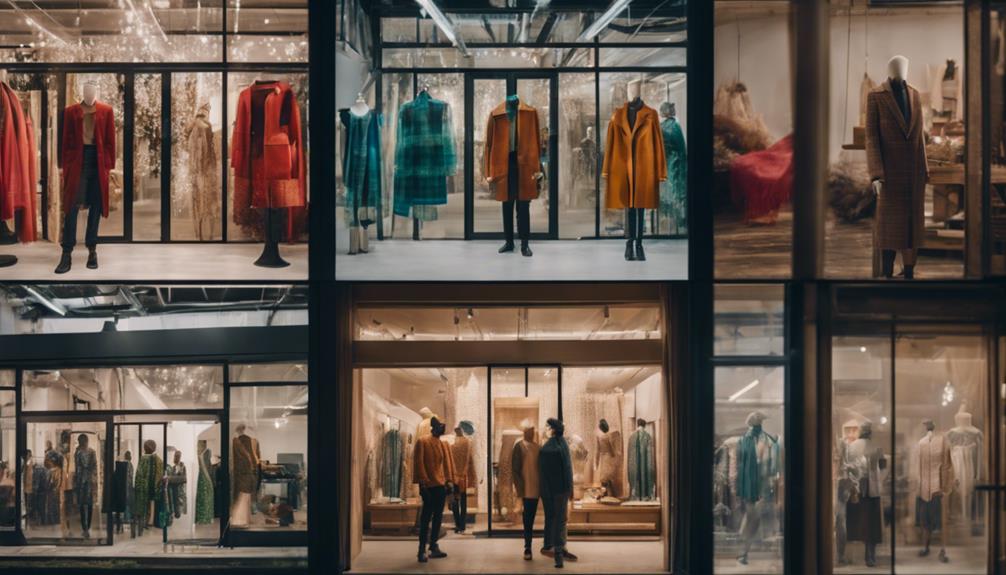
Brands play a crucial role in shaping consumer trust through transparency about their sustainability practices. As a consumer, you're increasingly aware of the impact your choices have on the environment. Here's what you need to know about how brands can meet your demand for sustainability:
- Materials Matter: 67% of you prioritize sustainable materials when making purchases, signaling a clear expectation for brands to adopt eco-friendly practices.
- Clear Goals Count: A whopping 72% of you're more likely to buy from companies that communicate clear sustainability goals, making transparency essential for brand loyalty.
- Accountability is Key: 28% of consumers have stopped buying from brands with poor sustainability practices. This shows that accountability directly influences your loyalty.
However, it's worth noting that 53% of you find sustainability claims confusing. This confusion highlights the need for brands to improve how they communicate their sustainable practices.
By being transparent about their materials and goals, brands can build trust and encourage you to make responsible purchasing decisions.
Ultimately, when brands hold themselves accountable, it aligns with your values and desires for a sustainable future.
Future Trends in Sustainable Fashion
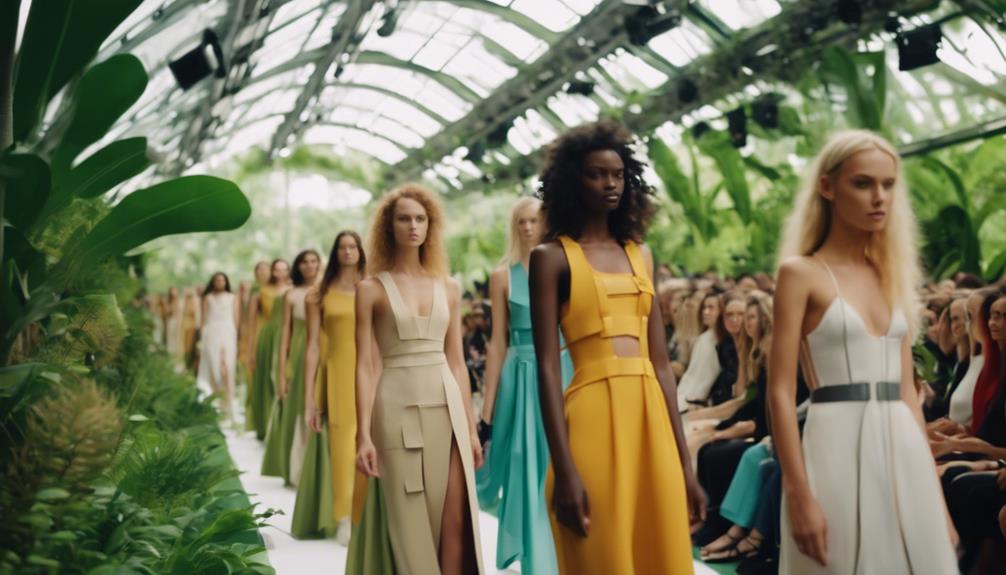
As transparency and accountability reshape the fashion landscape, future trends in sustainable fashion are poised to redefine how you shop and what you expect from your wardrobe choices.
The sustainable fashion market is set to grow considerably, projected to leap from $11.2 million in 2023 to $27.2 million by 2033. This growth reflects a strong demand for sustainability among consumers, who increasingly prioritize eco-friendly apparel. By 2026, sustainable apparel is expected to make up 6.14% of the overall fashion market, driven by your desire for transparency and ethical practices.
Innovations in materials and processes are on the rise, with brands investing heavily in research and development to create environmentally sustainable fabrics. Remarkably, 75% of Gen Z consumers are buying used clothing for environmental reasons, highlighting a major shift in shopping habits.
Legislative changes will further encourage sustainable practices in the fashion industry, aligning with your expectations for accountability. As brands adopt ESG strategies, you can anticipate a marketplace that not only offers stylish options but also prioritizes your values, making it easier to choose fashion that reflects your commitment to sustainability.
Frequently Asked Questions
Do People Really Care About Sustainable Fashion?
You might think people don't care about sustainable fashion, but many actually prioritize eco-friendly options. With growing awareness, more consumers are choosing brands that reflect their values, influencing the industry towards more sustainable practices.
Do Consumers Prefer Sustainable Clothing?
Sustainable styles steadily snag your attention, don't they? You're likely drawn to eco-friendly fabrics and brands. As awareness grows, you're increasingly prioritizing purchases that align with your values, making sustainable clothing a smart choice.
Do Consumers Care About Sustainable Products?
You care about sustainable products, as 67% of you prioritize eco-friendly materials in your purchases. Transparency matters, and many of you are willing to pay more for brands that demonstrate commitment to sustainability.
What Is the Consumer Sentiment on Sustainable Fashion?
You might be surprised to discover that consumer sentiment on sustainable fashion is strong. Many of you prioritize eco-friendly materials, yet a significant gap remains between your values and actual shopping behavior. What's holding you back?
What Is the Real Impact of Sustainable Fashion on Consumers’ Purchasing Decisions?
Sustainable fashion’s real impact on consumers’ purchasing decisions is significant, with an increasing number of consumers willing to pay more for eco-friendly and ethical products. As people become more aware of the environmental and social impact of their purchases, the demand for sustainable fashion continues to rise.
Conclusion
In the grand tapestry of fashion, your choices hold significant weight.
While many mightn't be shouting from the rooftops about sustainability, a quiet shift is happening beneath the surface.
You're increasingly seeking brands that embody transparency and responsibility.
Though the journey's fraught with challenges, your willingness to embrace change fosters a more conscious industry.
So, as you navigate your wardrobe, remember: every small step you take whispers a powerful message to the world.
